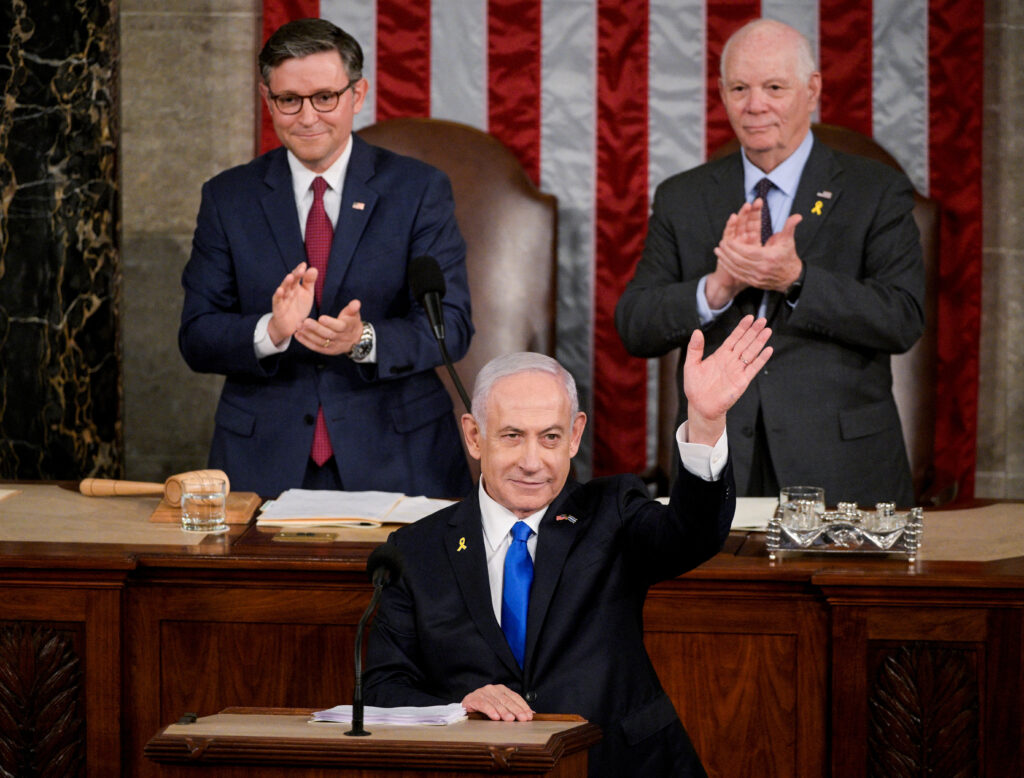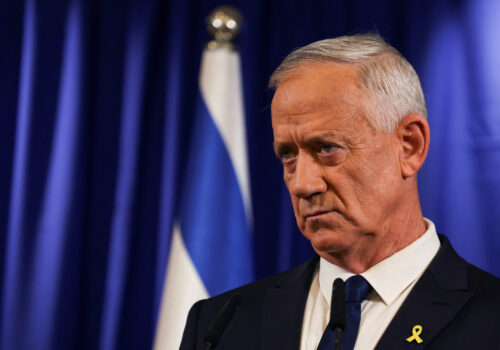Experts react: What Netanyahu’s address to Congress reveals about the state of US-Israel relations
“Our enemies are your enemies. Our fight is your fight. And our victory will be your victory.” That was the message Israeli Prime Minister Benjamin Netanyahu delivered on Wednesday to a joint session of the US Congress that dozens of lawmakers refused to attend. In his speech, Netanyahu called for further US support for Israel in its war against Hamas, which he framed as part of a larger regional struggle between Iran and the West. He also condemned his government’s critics, including anti-war protesters in the United States. Outside the Capitol, thousands of people protested Netanyahu’s visit and his government’s conduct of the war in Gaza.
Below, our experts break down Netanyahu’s message to Congress and what his visit to Washington reveals about the future of US-Israel relations.
Click to jump to an expert analysis:
William F. Wechsler: The “Abraham Alliance” idea is new, but not fully developed
Jonathan Panikoff: Netanyahu’s rhetoric today is less meaningful than his meetings tomorrow
Carmiel Arbit: The controversies plaguing Netanyahu at home followed him to Washington
The “Abraham Alliance” idea is new, but not fully developed
Netanyahu has proved once again that he is an excellent orator, but this address was almost entirely a collection of statements he’s made previously, packaged for a new audience and carefully balanced for the US election cycle to give talking points to both political campaigns.
The most important new policy idea offered was the creation of an “Abraham Alliance” that would build on the ad-hoc coalition that shot down Iranian missiles headed to Israel in April. Netanyahu knows that work on this is already underway, led by the United States. But these discussions are best held in private, through military-to-military channels. The Gulf states are reluctant to be seen as building mechanisms that will protect Israel but leave them on the front lines in any confrontation with Iran. Indeed, the Gulf’s public and diplomatic strategies toward Iran have gone in the opposite direction, with the United Arab Emirates (UAE), Saudi Arabia, and now Bahrain working to reestablish formal ties and improve commercial relations with Tehran.
—William F. Wechsler is the senior director of Middle East Programs at the Atlantic Council. His most recent US government position was deputy assistant secretary of defense for special operations and combating terrorism.
Netanyahu’s rhetoric today is less meaningful than his meetings tomorrow
Before Netanyahu’s address to Congress began today, CNN posted a video report with the headline, “What to expect from Netanyahu’s high stakes speech to Congress.” It was curious framing—the speech was never high stakes and nothing in its delivered content altered that reality.
For many on the left, represented by the large swath of Democratic lawmakers who didn’t attend, there was nothing that the prime minister could have said today that would have changed their opinion of him or Israel’s prosecution of the war in Gaza. For many center-left Democrats, centrists of both parties, and some Republicans, there was little he could have said to diminish their broader support for Israel, even while they maintain contempt for Netanyahu as its leader. And for many on the right, who view any criticism of Israel as inappropriate, there was unlikely to be anything the prime minister could have said to temper their support of him or Israel.
That does not mean that the speech wasn’t powerful and well-delivered. It was. Among the prime minister’s long-standing political gifts has been his eloquence in both Hebrew and English. His recognition of President Joe Biden’s support, especially in the immediate aftermath of the attacks on October 7, 2023, his criticism of those US protesters who have aligned themselves with Iran, and Hamas’s use of Palestinian civilians as human shields were all points strongly delivered that deserve to be highlighted.
But how much more powerful would the speech have been if it had contained the same robust defense of Israel and its military operations in Gaza, while also acknowledging the humanitarian tragedy that exists there today? How much more impactful would the speech have been if it had recognized that even if the Hamas-led health ministry numbers are inaccurate by having inflated numbers and not distinguishing between civilian and terrorist deaths, that still leaves at least twenty thousand innocent Palestinians who have perished during this conflict? War always results in civilian casualties. It’s a horrid reality. But recognizing that reality would have shown light on Netanyahu’s own humanity, which many view to be lacking.
Juxtaposed against today’s speech, what will be rather high-stakes are tomorrow’s meetings between Netanyahu and Biden and Vice President Kamala Harris. Negotiators have been trying for months to reach an elusive temporary ceasefire in which hostages held in Gaza would be returned to Israel and Israel would pause military operations in the Gaza Strip.
For months, Netanyahu and Hamas’s leader in Gaza (and the mastermind of October 7) Yahya Sinwar have actually been aligned in their goals to avoid a ceasefire. Sinwar is convinced that more fighting, and more Palestinian deaths, are a long-term net positive for Hamas. Netanyahu, who has been changing the terms of Israel’s requirements, is desperate to try to stay in office. As a result, the press accounts of tomorrow’s meetings and the potential for a ceasefire, whether temporary or permanent, are likely to be far more important than anything the prime minister said today in the Well of the House.
—Jonathan Panikoff is the director of the Atlantic Council’s Scowcroft Middle East Security Initiative. He is a former deputy national intelligence officer for the Near East at the US National Intelligence Council.
Netanyahu’s math that civilian casualties in Rafah have been “practically none” doesn’t add up
Whatever viewers started the day believing about Israel’s war in Gaza is almost certainly what they will end the day believing. If viewers can agree on any one thing, it is likely that the speech contained little if any new information and certainly no surprises. However, two points from Netanyahu’s speech do merit additional scrutiny.
The first is the civilian harm caused by the Israel Defense Force’s (IDF’s) air and ground operations in Gaza. As social media has been flooded with graphic images of the humanitarian devastation, Netanyahu would have been better served by acknowledging the ongoing human toll and making good-faith arguments about civilian harm. In his speech today, he claimed that civilian casualties in Rafah were “practically none,” when former members of his military forces paint a very different picture. It is not a good-faith argument to claim that civilian deaths are “practically none,” when sources both external and internal to the IDF have reported serious concerns about lax rules of engagement and a breakdown of discipline. Additionally, investigations have shown that after executing short-notice evacuations from densely populated areas, the IDF has established “no go” areas where individuals are considered a threat and shot on sight regardless of demographics or whether that person was armed. If Netanyahu wants to defend the IDF’s treatment of civilians, those arguments must at the very least be made in good faith and with a clear-eyed assessment of the facts.
The second is Netanyahu’s framing of the northern threat from Hezbollah. Though his remarks on Hezbollah were relatively brief, they made an impression. Right or wrong, he clearly framed Hezbollah as an existential threat to Israel that cannot be disentangled from their wider struggle against Hamas, the Houthis, and ultimately Iran. One possibility is that this speech was meant to set the stage for a ground incursion into southern Lebanon and soften global public opinion on such a decision. However, opening a new active front against Hezbollah would be catastrophic for many reasons, both humanitarian and strategic. For civilians living in both southern Lebanon and northern Israel, an active conflict would spell further displacement and suffering. For the beleaguered IDF, it would mean a full-scale war against a well-armed adversary and make further regional spillover ever more likely.
While Netanyahu’s fourth speech to Congress may go down in history as the highest number of congressional addresses by a foreign leader, it will likely be remembered for little else—except perhaps his commitment to a misleading representation of humanitarian realities.
—Emilia Pierce is the deputy director of operations and finance at the Atlantic Council’s Middle East Programs.
Netanyahu lays out a vision for postwar Gaza, but the serious talks are just starting
Netanyahu’s speech to Congress laid out his vision for postwar Gaza: a civilian administration run by Palestinians who do not seek to destroy Israel and are willing to live side by side in peace. While Netanyahu and his top advisers have said similar things before, the reported meeting convened on July 18 by UAE Foreign Minister Abdullah bin Zayed with top US and Israeli advisers shows that serious talks on postwar Gaza are just starting.
The key words to understand in Netanyahu’s speech are “de-militarization” and “de-radicalization.” Demilitarization means that Hamas should not be allowed to rule postwar Gaza, but it also means that Hamas cannot be allowed to follow the path of Lebanese Hezbollah—of letting someone else govern Gaza while Hamas rearms so that it can attack Israel again. Biden said something similar on May 31, as did US Secretary of State Antony Blinken on May 15 and July 1. Top US and Israeli officials are thus aligned on the goals, but with no agreement on a realistic, common plan to achieve them.
The key to how demilitarization can be achieved is a serious approach to what Netanyahu called de-radicalization. This will require taking control of Gaza’s institutions of governance away from Hamas or those who would tolerate Hamas’s re-armament. It will take a serious plan for keeping Hamas from killing the Palestinians who Netanyahu envisions would eventually govern Gaza. This is one of the practical steps that may come out of the discussions started in Abu Dhabi. There are a number of serious plans for how to do this, but as Netanyahu told Congress, it will take Israel, the United States, Arab nations, and Palestinians—all of them—to make this a reality.
—Thomas S. Warrick is a senior fellow and director of the Future of DHS Project at the Atlantic Council. He served in the Department of State from 1997-2007 and as deputy assistant secretary for counterterrorism policy at the US Department of Homeland Security from 2008 to 2019.
The controversies plaguing Netanyahu at home followed him to Washington
Before heading to Washington for his fourth address to Congress, Netanyahu had promised to deliver a unifying speech—to stay above the political disarray that has overtaken Washington, promote bipartisan support for the US-Israel relationship, and commit to a path to ending the war in Gaza. Insofar as he praised both Biden and former President Donald Trump, he was certainly less partisan than he was in his 2018 address decrying the Iran nuclear deal. Yet Netanyahu, aided by the extremism of his far-right coalition, has continued to preside over the politicization—and potential weakening—of the US-Israel relationship. Very little he said in today’s speech—which also failed to address a path forward—will change that.
By some accounts, roughly half of the Democrats from the House and Senate were absent from the event; compare this with the fifty-eight who sat out his address in 2018 and the five who boycotted Israeli President Isaac Herzog’s speech earlier this year. Democratic legislators are fed up with Netanyahu, who has all but endorsed Trump publicly and whose right-wing rhetoric and kowtowing to extremists is anathema to the party’s values. Their patience for the war in Gaza has waned significantly in the months since October 7, as the death toll among Gazans and hostages alike only grows in the absence of a ceasefire agreement with Hamas.
Yet despite this snub from so many members, Netanyahu will still have meetings with Biden, Harris, and both House and Senate minority and majority leadership. No matter how disliked Netanyahu may be, or how politically charged the war in Gaza may be for many Americans, the meetings underscore the enduring strength of the relationship between the two nations—or, as Netanyahu put it, that the victories of the countries are shared.
Still, Netanyahu’s addresses to the United States are never really intended for American audiences alone, and he is deft in leveraging both negative and positive receptions in Washington to bolster his standing at home. The divisions and controversies plaguing Netanyahu in Israel followed him to Washington. His tribute to the hostages rang hollow for many Israelis—including those present in the Capitol today. Several family members of hostages being detained during Netanyahu’s speech was a startling image for Americans—and a reminder of the complexities of what’s at stake almost a year into the war.
—Carmiel Arbit is a nonresident senior fellow in the Middle East Programs and the Scowcroft Middle East Security Initiative at the Atlantic Council.
Further reading
Tue, Jul 16, 2024
Israeli officials are accused of weaponizing starvation in Gaza. Here’s what you need to know.
New Atlanticist By Alana Mitias, Yousuf Syed Khan
In May, International Criminal Court Prosecutor Karim A. A. Khan requested arrest warrants for top Israeli officials, including for the crime of starvation, which has never before been prosecuted at the international level.
Fri, Jun 14, 2024
Razing the dead: Contextualizing IDF cemetery desecration in Gaza
MENASource By Charles Johnson
When the IDF razes Gazan cemeteries, it also razes Palestinian heritage, culture, and claims to the land.
Wed, Jun 12, 2024
Gantz’s exit has further empowered Israel’s far right. Here’s what to expect now.
New Atlanticist By Carmiel Arbit
With the centrist Gantz’s departure, Netanyahu and his extreme right coalition government are left to manage Israel’s crises on their own.
Image: U.S. House Speaker Mike Johnson (R-LA) and Senate Foreign Relations Chair, Senator Ben Cardin (D-MD), applaud as Israeli Prime Minister Benjamin Netanyahu addresses a joint meeting of Congress at the U.S. Capitol in Washington, U.S., July 24, 2024. REUTERS/Craig Hudson



